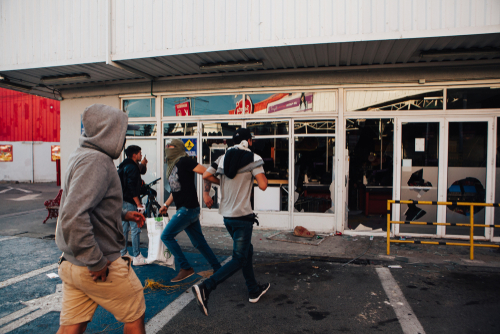
In the heart of Minneapolis, a once peaceful neighborhood has been transformed into a hotbed for illicit drug activities. The residents, feeling abandoned and helpless, are crying out for their elected leaders to intervene.
Jay Dorsey, a homeowner in North Minneapolis, paints a grim picture of his street, which has become a notorious destination for drug deals.
“We are an established destination now for drug purchases. Cars stop by 24/7 and within moments they have a carhop with their face in the passenger window, ready to serve,” Dorsey lamented.
His home is situated across from an Aldi store that closed earlier this year, much to the disappointment of local residents.
“I want lawmakers to understand how abandoned and helpless we feel when we reach out to those who are supposed to help us and we get excuses or silence,” one resident said.https://t.co/ELk9VSTmCQ
— Alpha News (@AlphaNewsMN) August 31, 2023
The closure of the Aldi store marked the beginning of a troubling era for the neighborhood.
“Aldi moved out and they moved in,” Dorsey explained, referring to a group of homeless individuals who have taken up residence on the sidewalk across from his house. He refrains from calling it an encampment as there is only occasionally a tent, but some sleep on chairs on Oliver Avenue.
The situation has escalated beyond mere inconvenience. Dorsey shared harrowing accounts of crimes that have occurred in his area.
An elderly woman was assaulted and sent to the ER, packages have been stolen, houses threatened, and one neighbor’s home was burglarized. In another shocking incident, a neighbor’s windows were shot out and her back fence was plowed through during an alley fight.
Despite reaching out to government officials including Governor Tim Walz, Mayor Jacob Frey, and some City Council members, Dorsey claims he received no response or mere political platitudes.
“I want lawmakers to understand how abandoned and helpless we feel when we reach out to those who are supposed to help us and we get excuses or silence,” he said.
The degradation of the neighborhood reached such a point that Dorsey witnessed men and women urinating and doing drugs from his bedroom window. Another resident captured people defecating in public, stating homeless residents “sleep in lounge chairs at night.”
This is how the end starts, Not with bullets or bombs, but with corruption and misinformation. Liberal politicians making drugs legal (ex Portland), trying to defund the police (ex Minneapolis), refusing to deal with crime (ex Chicago, San Francisco)…all Blue cities and states
— Eric B (@Eric55006362) August 31, 2023
Dorsey expressed concern for the children in the neighborhood who have to navigate through this environment. While he admits to feeling less safe, he also feels embarrassed.
“Friends are scared or pity me and they certainly don’t want to park in front of an ‘opium den,’” he said.
While the city did not respond to a request for comment, it has established a webpage for its response to homelessness.
The City’s Homeless Response Team (HRT) claims to address encampments by building relationships and connecting unsheltered individuals to resources, services, and shelter. However, for residents like Dorsey, these efforts seem insufficient and distant from the reality they face daily.
As Dorsey’s experience shows, the consequences of inaction are dire and can transform a once-thriving neighborhood into a hub for illegal acts.













